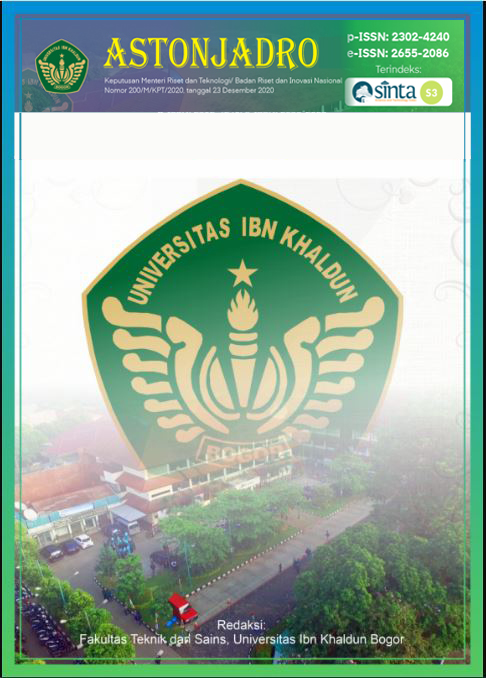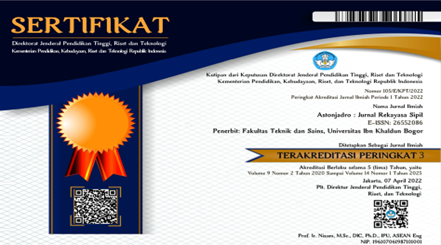Exposure Analysis of Heavy Metals in Dugs Well Water of Telutu Jaya Village Community, Tinanggae District, South Konawe Regency
DOI:
https://doi.org/10.32832/astonjadro.v13i3.15474Keywords:
dug well water; heavy metal exposure; RfD/SF; heavy metal elements; ARKL.Abstract
The ideal drinking water requirement is clean water that is colorless, odorless, and tasteless, doe not contain pathogenic germs, does not contain chemicals or heavy metals, does not endanger the health of living things, and is not economically harmful. The ARKL study is intended to calculate or predict the risk to human health, including identification of the presence of uncertainty factors, tracing to specific exposures, taking into account the inherent characteristics of the agent of concern, and the characteristics of specific targets. Based on the ARKL study, the minimum RQ and maximum RQ values for each risk agent are <1 (safe). This study used dug-well water from the community of Telugu Jaya Village. The purpose of the study was to assess the risk of exposure to heavy metals contained in dug-well water. Measurement parameters were carried out in the form of Ph, TSS, and nine heavy metal elements (Cu, Cd, Cr6+, CrT, Pb, Ni, Fe, Zn, and Co). After the measurement, the risk of heavy metal exposure to local community-dug well water was analyzed. The results showed that HI <1, so it was concluded that the level of heavy metal intake from the dug well was still below the reference dose (RfD), which means that the exposure limit was still safe.
References
Agency for Toxic Substances and Disease Registry (ATSDR). 2005. Toxicological Profile for Nickel. U.S. Department of Health and Human Service. Online https://www.atsdr.cdc.gov/toxprofiles/tp15.pdf (Accessed on May 18, 2023)
Agustina, Linda. 2019. Environmental Health Risk Analysis of Drinking Water Parameters for Workers in Pasuruan Regency in 2017. MTPH Journal Vol 3:1
Directorate General of PP and PL. 2012. Environmental Health Risk Analysis Guidelines. Jakarta.
Effendi, H. 2003. Water Quality Assessment for the Management of Aquatic Resources and Environment. Yogyakarta: Kanisius Publisher 8th cet.
Irfandi, A, Ashar, T, Chahaya, I. 2013. Analysis of Cadmium (Cd) and Lead (Pb) Battery and Problems Health in the Community of Village, Bandar Khalipah Regency Dug Serdang in 2013 Journal. Environmental Health
Ministry of Lingkungan Environment and Forestry, Directorate of Management Hazardous Waste 2017.Getting to Know Metals Heavy Jakarta.
Indonesian Ministry of Health. (2012). Ministry of Health Directorate General of PP and PL. 2012. Guidelines for Environmental Health Risk Analysis. Jakarta.
Munfiah, S, Nurjazili and Setiani, O. 2013. Physical and Chemical Quality of Water from Dug Wells and Bore Wells in the Working Area of Guntur II Health Center, Demak Regency. Journal. Environmental Health. Volume 12:2
Regulation of the Minister of Environment and Forestry of the Republic of Indonesia No. 5 Year 2022. Wastewater Treatment for Mining Business and/or Activities Using the Artificial Wetland Method. Jakarta: Government Regulation
Regulation Minister of Environment No. 9 Year. 2006. Wastewater Quality Standard for Nickel Mining Activities. Jakarta: Government
Regulation Minister of Health No. 2 Year. 2023. Environmental Health. Jakarta: Government
Regulation Government No. 22 Year. 2021. Implementation of Environmental Protection and Management. Jakarta: Government
Regulation Government No. 82 Year. 2001. Management Quality Water and Control Pollution Water: Government
Ridhowati, S. 2013. Getting to Know Various Metal Pollution. Yogyakarta: Graha ilmu
Rusli, Muhammad. 2017. Risk of Heavy Metal Exposure in River Water. Journal of Environmental Health Vol. 14:2.
Sarudji, D. 2015. Environmental Health. Sidoarjo: Media Science
Suarsana, K.I. 2008. Effect of Nickel Plating Time on Copper din Plating Chrome m on Decorative Tingkat Brightness and Thickness Coating. Journal of TeMechanical Engineering. Volume 2:1
Trisnawulan et.al, 2007. Water Quality Analysis of Dug Wells in Sanur Tourism Area. OJS UNUD.ac.id
Widowati, W., Sastiono, A., & Jusuf, R. 2008. Toxic Effects of Metals. Yogyakarta: ANDI.
Downloads
Published
How to Cite
Issue
Section
License
Copyright (c) 2024 ASTONJADRO

This work is licensed under a Creative Commons Attribution-ShareAlike 4.0 International License.
Paper submitted to ASTONJADRO is the sole property of the Astonjadro Journal. Unless the author withdraws the paper because he does not want to be published in this journal. The publication rights are in the journal Astonjadro.ASTONJADRO
LICENSE
This work is licensed under a Creative Commons Attribution-ShareAlike 4.0 International License.
Based on a work at http://ejournal.uika-bogor.ac.id/index.php/ASTONJADRO













